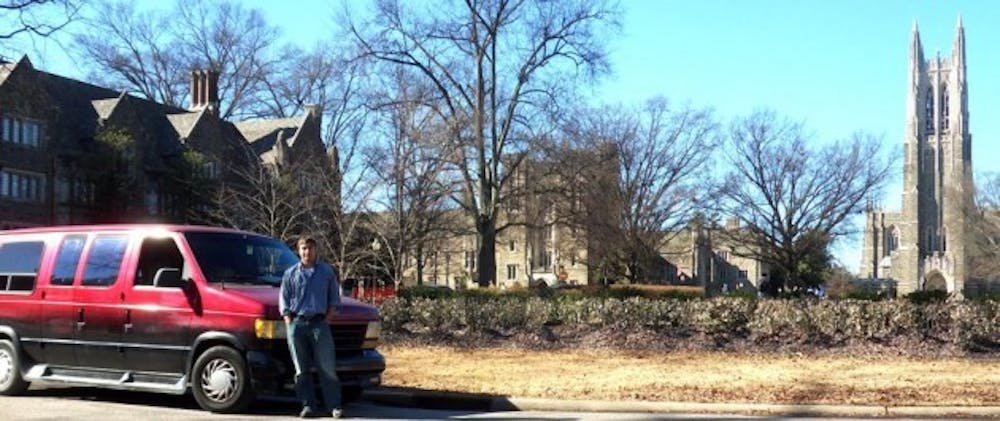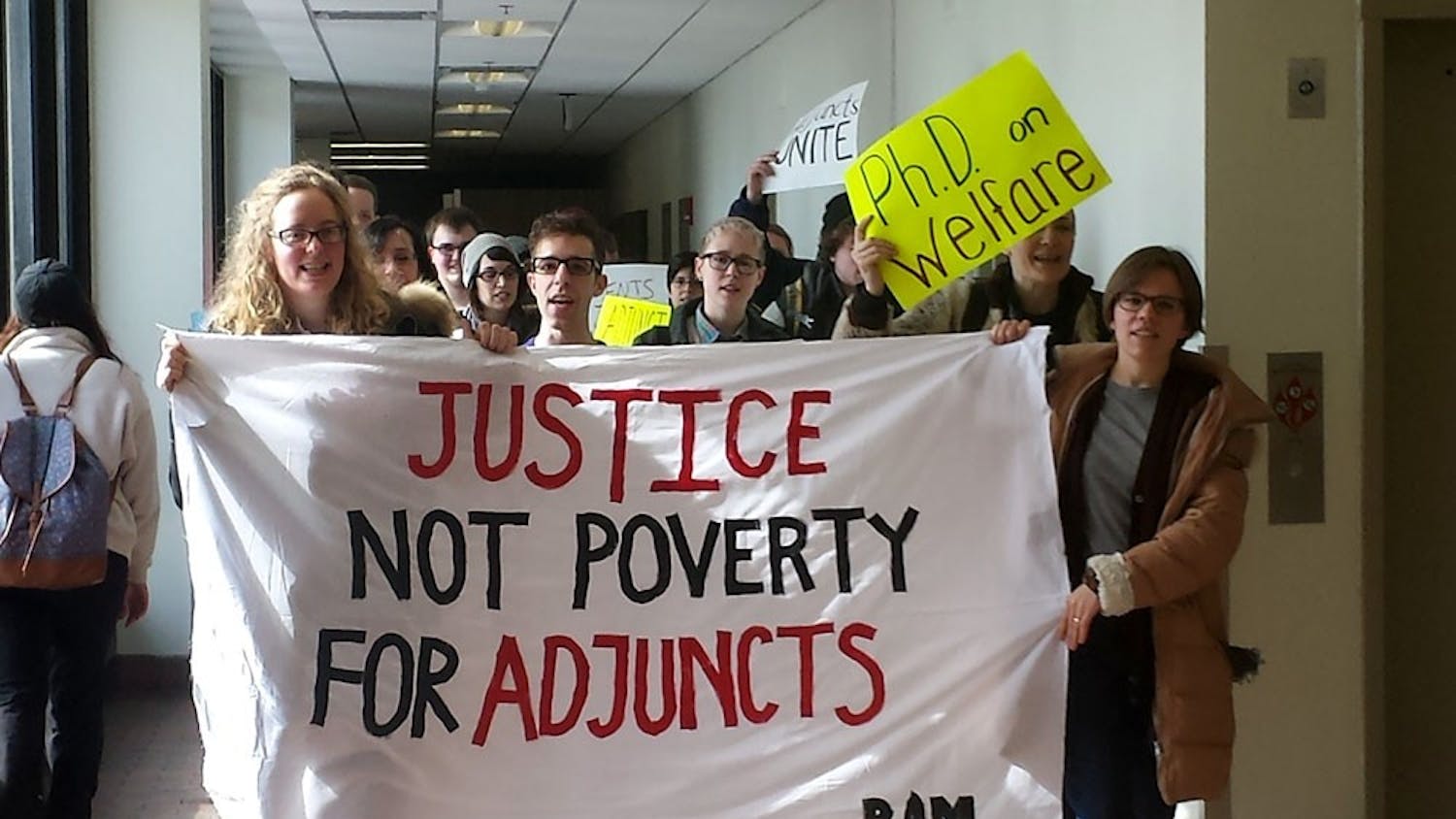It had been months since Ken Ilgunas had a real conversation.
He was daydreaming in the library at Duke University, watching the hairs on his arm rise and fall gently, when he began to get hot flashes. He rushed to his van in the parking lot and hastily reached for his garbage can. He made it just in time, as vomit exploded out of his mouth. His head was throbbing when he noticed the water dripping onto his leg.
There was a hole in the roof of his van and rain was falling through it. He would have gone home, but the van was his home. This was the moment he most doubted his life decision.
Ilgunas, a UB alum, spent two and a half years living in his van so he could attend graduate school without accruing debt.
Ilgunas' van-dwelling story led him to: writing an article for The New York Times, talking on The Tonight Show with Jay Leno and publishing a novel-length memoir entitled Walden on Wheels: On the Open Road from Debt to Freedom, which has sold over 18,000 copies since its May release.
But the van experiment wasn't his first or his last freedom-seeking trip to push himself.
"The soul must first be caged before it can be free," Ilgunas said when he returned to UB for a talk this past Monday.
Just before graduating from UB in 2007 with a double major in English and history, Ilgunas applied to 25 paid newspaper internships. He was an aspiring journalist with experience after working for The Spectrum for two years and interning at Artvoice, but he was rejected from all 25.
With $32,000 in debt from student loans and no job, Ilgunas was desperate.
So he did what most would in that situation - call a previous employer. He had spent the summer between his fourth and fifth years at UB working as a maid in Coldfoot, Alaska - a town with a population of 10, according to the 2010 U.S. census. Ilgunas was offered a job as a tour guide and began to pay off his debt.
Most people would have found a job in their hometown while living with their parents to pay off college loans. But Ilgunas is an adventurer.
After working as a maid for some time, he decided to hitchhike 5,500 miles, canoe another 1,000 miles across Ontario with "voyageurs" (people who reenact the lives of 18th century fur traders), work on a trail crew in Gulfport, Miss., and finally finish paying off his debt back in Coldfoot as a backcountry ranger in the Gates of the Arctic National Park.
But Ilgunas still wasn't satisfied with his adventures. He had found a "renaissance" at UB, as he calls it, where for the first time in his life he had goals, values, dreams and aspirations. Ilgunas wasn't mentally stimulated from the hard work he had done in the past few years.
"My brain just feels like this orange left out in the sun, just like withering away, and I had this deep craving for the liberal arts," Ilgunas said. "I wanted to re-immerse myself in a world of thought and ideas and ancient texts of the classics."
But there was something standing in the way of going back to school and getting the education that he missed so much: money.
"Going into debt at that point was unthinkable," Ilgunas said. "Working so hard to pay it off - there was no way I was going back into debt."
***
Ilgunas says he told his mom, Tina Ilgunas, that he was going to live in a van while attending graduate school at Duke University a little while before moving to Durham, N.C. She claims that he never told her before actually doing so. Ilgunas thinks her lapse in hearing was a "momentary defense mechanism."
After Tina was questioning her son about where he was living and even provided him with some housing options, she received an email from him that casually buried what his new home was in between daily rudimentary conversation. She was concerned.
"I just thought something was wrong [mentally], that somebody would have to do something like [live in a van]," Tina said.
But there was nothing wrong with Ilgunas. He saw the van as a "practical way of avoiding apartment rent," and, of course, as an adventure.
"Going into an apartment, even if it was offered for free, I don't know if I would've taken it," Ilgunas said. "[The van] was kind of me embracing this simplistic life. At the same time, it was a challenge ... It was kind of an experiment to see what I needed in an urban planet-state - to try to find the line between my true wants and my true needs."
Though it might sound exciting and freeing, it wasn't always easy. Ilgunas was lonely. If he told anyone about his newest home of the Duke parking lot, which was conveniently located next to a senior apartment complex, he risked being exposed. The parking lot's location helped keep the 1994 Ford Econoline van with the red-to-black gradient paint job from looking like it didn't belong. Campus security most likely assumed the owner lived in that building.
Even still, caution was a top priority. Ilgunas would peek through the mini blinds attached to his windows every morning before exiting and would make sure nobody saw him get in at night. The whole situation made it very difficult to build relationships.
"I sort of felt sorry for him," Tina said. "I thought how lonely it must be and I worried about his hygiene. And he always had an answer for me that made sense."
Ilgunas would shower at the university gym and would eventually meet some people who could be trusted with his secret. Approaching people with the idea was always a tricky situation.
"You can't say, 'Hey, I live in a van.' That's like saying, 'Hey, I have this hideous, suppurating STD,'" Ilgunas laughed.
He still managed to maintain a romantic relationship for a few months during his two-and-half year stay at Duke. Date night in the van included a movie from the library, Ilgunas' laptop and his -20 degree Fahrenheit sleeping bag.
Though his rent was free, Ilgunas' tuition was not. He found that if he "demonstrated financial need" he could receive up to 66 percent off his tuition, but that still meant he had to pay for that remaining one third. During his stay at Duke, he participated in over 25 paid experimental studies.
"I was zapped by electrodes, pricked by needles, dazed by pharmaceuticals, and I can even say that I shared three of my four primary bodily fluids," Ilgunas wrote for Duke Magazine.
Ilgunas had finished the semester successfully without ever being revealed. He could now return to Alaska, where he would work for the summer and make enough money to get an apartment when he returned to Duke in the fall, which was the plan all along. But when he returned to that familiar parking lot surrounded by dogwood trees with his van, he felt home.
Ilgunas eventually went public about his van-dwelling adventure through graduate school by writing an article for Salon.com entitled 'I live in a van down by Duke University' that December.
There was nothing in Duke's parking policies against what Ilgunas was doing, and if Duke responded negatively to his admission, it would have been a public relations nightmare for them. After all, he was just a struggling student who wasn't harming anyone, living in a van while attending graduate school. So he continued to live there for the following two years until he completed his Master's degree in Liberal Studies, but he did leave a piece of his unorthodox legacy behind.
"They created a law at Duke prohibiting any future van-dwellers from living on campus," Ilgunas said. "I feel pretty bad about that - preventing someone else from experiencing it."
***
"Crazy ideas, they sometimes represent some aching, existential need that has gone unfulfilled," Ilgunas told UB in his talk on Monday.
With no trails, guides or guidebooks available, the 1,700-mile hike from Alberta, Canada, to Port Arthur, Texas, is certainly a 'crazy idea.'
This hike, the potential future site of the Keystone XL pipeline, was Ilgunas' most recent, self-stimulating adventure since graduating from Duke.
After hitchhiking 1,500 miles, he began the hike in Hardesty, Alberta - which is the beginning of the would-be $5.2 billion pipeline. Thirty-six inches in diameter and sitting at least four feet below the earth's surface, this express line would carry 830,000 barrels of oil a day from the oil sands of Canada to the refineries in Texas.
Ilgunas describes the oil sands as "essentially just this giant, apocalyptic mud pit."
Workers will extract bitumen from this Florida-sized "mud pit" and refine it to a more liquid state to be transported in the Keystone XL.
"Getting the bitumen out of the ground is an energy-intensive process producing far more greenhouse gasses into the atmosphere than conventional sources of oil," Ilgunas said.
With just his 30-pound pack of essential needs, Ilgunas began his 5-month trip in September 2012, right on the cusp of a brutal Canadian and mid-western winter.
After just three days of intense hiking, he had to cover his toes in duct tape to avoid spreading his Athlete's foot. He had blisters all over his feet, and his ankles were cut up. But slowing down wasn't an option.
It was not all bad, though, as Ilgunas began to fall in love all over again with the wilderness, just as he had done before in Alaska.
"I get used to the chatter of coyotes around my tent each night," Ilgunas said. "When I'm walking, I'll see this giant herd of deer of 50 strong, running across this butterscotch field, and all leaping together all at once over a barb-wired fence. Sometimes, I'll see 5,000 ducks rise from a hayfield and swirl through the sky."
He went three or so days at a time without seeing or talking to another person, but when he did meet people, there was plenty to talk about. Ilgunas had to be careful, though, considering he was crossing through what is the heart of red state America as a liberal environmentalist.
"To break through to people who you disagree with, I find that just being respectful and intelligent, you get respect and intelligence back," Ilgunas said.
People often laughed at his views, but that didn't matter to him because he was generating important discussion about an important topic. Ilgunas received coverage of his hike through CBC News, The New York Times, Huffington Post, NPR and more along the way.
Every day, people would pull over while they were driving to offer him rides, money and even bags of McDonald's.
"When someone who is living in abject poverty pulls over and offers you $20, it is just heartbreaking," Ilgunas said.
Tina was happy to see her son making an impact on the world.
"The thing that kept me straight and narrow was when I'd read his blog every day and read the adventures he had when he was on the pipeline," Tina said. "I loved reading about the people he met and how he was treated and I looked forward to it every day, and I knew he was OK."
Ilgunas' hike hasn't gone unnoticed, but will it be for naught? Construction on the Keystone XL has already begun as certain phases have been approved, although several other phases have not. Because TransCanada, the company that is building the pipeline, is a foreign company, President Obama himself must approve the construction.
"This is a unique opportunity in which it is just up to one person, and if the citizens can convince this one person, President Obama, then it is a battle won," Ilgunas said.
Ilgunas believes that there is a new awareness surrounding the issue of climate change, saying that "97 percent of climate scientists assert that there's a man-made cause to climate change."
Five months after he began his hike in Alberta, Ilgunas started to notice a change in the air. As he drew nearer to Port Arthur, Texas, his destination, there was a smell that he struggled to define. When he reached the end of his trip, he was finally able to articulate it.
"It's like a bonfire was put out by a gallon of Windex," Ilgunas said.
***
Ilgunas returned to UB to deliver two talks this week, on Monday and Tuesday. He spoke on his adventure to conquer student debt and offered advice for current prospective students.
"I think a lot of people heading into undergraduate school, especially, they're attracted to certain schools for the wrong reasons: for prestige or for a good football or basketball team or for lavish amenities ... What's really important is that there's a good professor in a small classroom," Ilgunas said.
He encourages students to narrow down what's important in a school and commute from home if possible. He said he has "nothing but fond" memories of UB and that is part of the reason he returned to school when he enrolled at Duke - because he wanted to recapture the feeling he had here.
Ilgunas is currently writing a book about his hike down the pipeline titled Trespassing across America. But it'd be foolish to think his adventures are over.
Next, he wants to condense all 200,000 years of human history into five significant phases and live out all the phases in one year. The phases: hunter/gatherer in Africa, primitive farmer in the fertile crescent, a tradesman, a textile mill worker in China and some sort of high-tech employee.
He figures to finish editing and publishing Trespassing across America in the next year. His first book, Walden on Wheels: On the Open Road from Debt to Freedom, is available on Amazon.
Sure, he has moments of doubt, like the time he purged his insides in a garbage can as he sat in his van and rain fell on his leg. But the next day, he cleaned his van from top to bottom, scrubbed all his pots and pans and refocused on his goal. It was a setback, but setbacks are inevitable in any adventure.
Ilgunas doesn't think his explorations are that eccentric - he just sees them as a quenching to his soul's thirst for adventure and experimentation to push himself. He urges everyone to satisfy their own soul's need.
His thirst led him from UB to hitchhiking across America to living in a van to trekking along the Keystone XL Pipeline. Where will yours lead you?
email: brian.keschinger@ubspectrum.com




